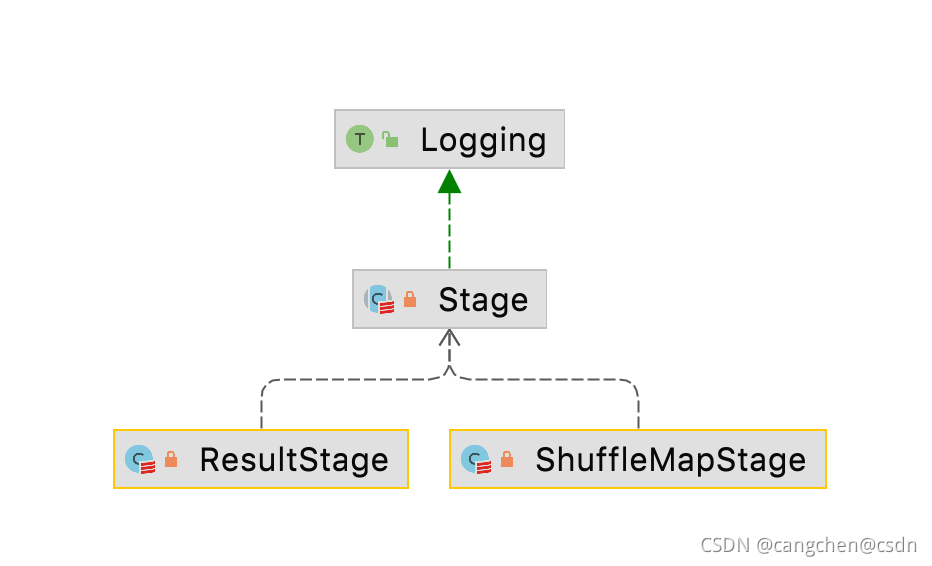一,stage类图

二,源码跟踪
入口
val sparkConnf=new SparkConf().setAppName("wordCount").setMaster("local[3]")
val sparkContext=new SparkContext(sparkConnf)
val rdd=sparkContext.parallelize(Array("hello thank you thank you very much are you ok"),3)
val words_rdd=rdd.flatMap(word=> word.split(" "))
val keyValue_rdd=words_rdd.map(word=>(word,1))
val result=keyValue_rdd.reduceByKey((x,y)=>x+y)
result.collect().map(x=> println(x._1+":"+x._2))
sparkContext.stop()
点击result.collect() 跟踪方法调用。关键代码截图:



出现了一个名为eventThread的线程。
// Exposed for testing.
private[spark] val eventThread = new Thread(name) {
setDaemon(true)
override def run(): Unit = {
try {
while (!stopped.get) {
val event = eventQueue.take()
try {
onReceive(event)
} catch {
case NonFatal(e) =>
try {
onError(e)
} catch {
case NonFatal(e) => logError("Unexpected error in " + name, e)
}
}
}
} catch {
case ie: InterruptedException => // exit even if eventQueue is not empty
case NonFatal(e) => logError("Unexpected error in " + name, e)
}
}
}
eventThread是一个守护线程,启动后从eventQueue中获取上文中post函数提交的对象,并通过子类的onReceive函数处理。
JobSubmitted(jobId, rdd, func2, partitions.toArray, callSite, waiter,Utils.cloneProperties(properties))


/**
* Create a ResultStage associated with the provided jobId.
*/
private def createResultStage(
rdd: RDD[_],
func: (TaskContext, Iterator[_]) => _,
partitions: Array[Int],
jobId: Int,
callSite: CallSite): ResultStage = {
checkBarrierStageWithDynamicAllocation(rdd)
checkBarrierStageWithNumSlots(rdd)
checkBarrierStageWithRDDChainPattern(rdd, partitions.toSet.size)
val parents = getOrCreateParentStages(rdd, jobId)
val id = nextStageId.getAndIncrement()
val stage = new ResultStage(id, rdd, func, partitions, parents, jobId, callSite)
stageIdToStage(id) = stage
updateJobIdStageIdMaps(jobId, stage)
stage
}
val parents = getOrCreateParentStages(rdd, jobId)
/**
* Get or create the list of parent stages for a given RDD. The new Stages will be created with
* the provided firstJobId.
*/
private def getOrCreateParentStages(rdd: RDD[_], firstJobId: Int): List[Stage] = {
getShuffleDependencies(rdd).map { shuffleDep =>
getOrCreateShuffleMapStage(shuffleDep, firstJobId)
}.toList
}
getShuffleDependencies(rdd) 会从后往前查找rdd每条依赖链上的最后一级ShuffleDependency。
/**
* Returns shuffle dependencies that are immediate parents of the given RDD.
*
* This function will not return more distant ancestors. For example, if C has a shuffle
* dependency on B which has a shuffle dependency on A:
*
* A <-- B <-- C
*
* calling this function with rdd C will only return the B <-- C dependency.
*
* This function is scheduler-visible for the purpose of unit testing.
*/
private[scheduler] def getShuffleDependencies(
rdd: RDD[_]): HashSet[ShuffleDependency[_, _, _]] = {
val parents = new HashSet[ShuffleDependency[_, _, _]]
val visited = new HashSet[RDD[_]]
val waitingForVisit = new ListBuffer[RDD[_]]
waitingForVisit += rdd
while (waitingForVisit.nonEmpty) {
val toVisit = waitingForVisit.remove(0)
if (!visited(toVisit)) {
visited += toVisit
toVisit.dependencies.foreach {
case shuffleDep: ShuffleDependency[_, _, _] =>
parents += shuffleDep
case dependency =>
waitingForVisit.prepend(dependency.rdd)
}
}
}
parents
}

如上图的依赖关系会返回ShuffleDependency1,ShuffleDependency3组成的hashset。
继续跟踪getOrCreateShuffleMapStage(shuffleDep, firstJobId)
/**
* Gets a shuffle map stage if one exists in shuffleIdToMapStage. Otherwise, if the
* shuffle map stage doesn't already exist, this method will create the shuffle map stage in
* addition to any missing ancestor shuffle map stages.
*/
private def getOrCreateShuffleMapStage(
shuffleDep: ShuffleDependency[_, _, _],
firstJobId: Int): ShuffleMapStage = {
shuffleIdToMapStage.get(shuffleDep.shuffleId) match {
case Some(stage) =>
stage
case None =>
// Create stages for all missing ancestor shuffle dependencies.
getMissingAncestorShuffleDependencies(shuffleDep.rdd).foreach { dep =>
// Even though getMissingAncestorShuffleDependencies only returns shuffle dependencies
// that were not already in shuffleIdToMapStage, it's possible that by the time we
// get to a particular dependency in the foreach loop, it's been added to
// shuffleIdToMapStage by the stage creation process for an earlier dependency. See
// SPARK-13902 for more information.
if (!shuffleIdToMapStage.contains(dep.shuffleId)) {
createShuffleMapStage(dep, firstJobId)
}
}
// Finally, create a stage for the given shuffle dependency.
createShuffleMapStage(shuffleDep, firstJobId)
}
}
getMissingAncestorShuffleDependencies函数会根据依赖链以上文找到的最后一级ShuffleDependency的父RDD为起点从后往前追溯,获取所有的ShuffleDependency组成队列返回,prepend函数将新的元素插入到队列的开始位置,所以返回的ancestors队列中祖先的ShuffleDependency在队首,子ShuffleDependency在队尾,与DAG中顺序一致。

createShuffleMapStage函数会按照DAG中ShuffleDependency出现的顺序依次被调用创建ShuffleMapStage,并存储在名为stageIdToStage的HashMap[Int, Stage]中,key依次递增。如果有多个依赖分支,则一个一个分支创建,祖先ShuffleMapStage编号小于子ShuffleMapStage编号。
private val nextStageId = new AtomicInteger(0)
private[scheduler] val stageIdToStage = new HashMap[Int, Stage]
/**
* Creates a ShuffleMapStage that generates the given shuffle dependency's partitions. If a
* previously run stage generated the same shuffle data, this function will copy the output
* locations that are still available from the previous shuffle to avoid unnecessarily
* regenerating data.
*/
def createShuffleMapStage[K, V, C](
shuffleDep: ShuffleDependency[K, V, C], jobId: Int): ShuffleMapStage = {
val rdd = shuffleDep.rdd
checkBarrierStageWithDynamicAllocation(rdd)
checkBarrierStageWithNumSlots(rdd)
checkBarrierStageWithRDDChainPattern(rdd, rdd.getNumPartitions)
val numTasks = rdd.partitions.length
val parents = getOrCreateParentStages(rdd, jobId)
val id = nextStageId.getAndIncrement()
val stage = new ShuffleMapStage(
id, rdd, numTasks, parents, jobId, rdd.creationSite, shuffleDep, mapOutputTracker)
stageIdToStage(id) = stage
shuffleIdToMapStage(shuffleDep.shuffleId) = stage
updateJobIdStageIdMaps(jobId, stage)
if (!mapOutputTracker.containsShuffle(shuffleDep.shuffleId)) {
// Kind of ugly: need to register RDDs with the cache and map output tracker here
// since we can't do it in the RDD constructor because # of partitions is unknown
logInfo(s"Registering RDD ${rdd.id} (${rdd.getCreationSite}) as input to " +
s"shuffle ${shuffleDep.shuffleId}")
mapOutputTracker.registerShuffle(shuffleDep.shuffleId, rdd.partitions.length)
}
stage
}
三,结论
ShuffleMapStage与ShuffleDependency的一一对应;
总stage的数量=ShuffleMapStage总数 + 1(一个ResultStage)。
